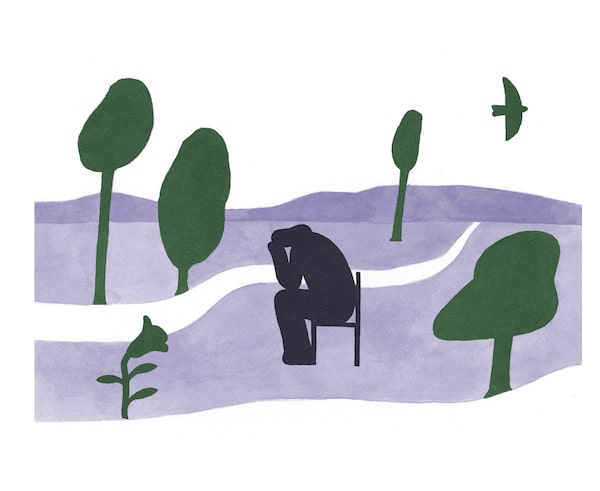First Person is a daily personal piece submitted by readers. Have a story to tell? See our guidelines at tgam.ca/essayguide.

Illustration by Mary Kirkpatrick
I was standing in line at a suburban auto body shop waiting for a quote on my dented bumper when the e-mail came through from the funeral home. “Baby’s ashes ready for pickup” read the subject line.
About a month prior, after 21 weeks of growing inside of me, I had lost my baby. Our weeks together weren’t easy. Like for many pregnant people, almost constant nausea and vomiting consumed the first weeks of my pregnancy. And just as the retching was easing and I hoped for some enjoyment of this exciting time, a tug in my abdomen began causing pain so severe I wondered how billions of people had managed pregnancy before me.
And then she was gone. A daughter. Anna. My daughter Anna.
The initial days of loss were an apocalypse. I had landed in a place so foreign and ambiguous that the map to get me to somewhere I knew seemed non-existent. Everywhere felt uncomfortable. Every decision impossibly straining. I didn’t know where to place my foot for the next step forward.
On Day 1 of losing Anna, I hastily made the choice to get the baby clothes out of the house. I gathered all her baby gear and drove to a local thrift shop. As I emptied the bags into the donation bin, it felt like I was passing on my hopes and dreams for this child into the lives of others who would go on to become parents. As they dressed their little ones in Anna’s clothing, they would have no idea why her outfits found their way to a thrift shop. My eyes flooded with tears. I drove home and, in a trance, accidentally backed my car into the side of my garage.
There is no guidebook that could have made those first weeks any better – no How To when it comes to stillbirth. Yes, support groups, therapy and SSRIs exist and do help, but nothing could have made that dark period move faster. Grief would invade every aspect of the day and evade all attempts to schedule it in. In my best moments, I aimed for neutrality – not even happiness, just simply existing without feeling utter despair.
Everything reminded me of what had happened. I looked like I was functioning, and I was to some extent, but it took only a small spark to reignite the reality of grief. While busy making a family dinner one night, my dear brother-in-law mentioned the chocolate pudding containers I had in the fridge. I had bought them when I couldn’t get much down in my first trimester. I now wished I had thrown them out.
But as much as I don’t want the searing pain of loss to last forever, I also want to remember the ways in which I existed during this difficult time. I’ve spent time recognizing, sitting with, and feeling my grief. I’ve slowed down and sunken deeply into hard emotions. This feels very unnatural in a world that is always hoping we are moving forward quickly. A world that hopes we are getting back into the swing of things. A world where we’re taught to believe that two truths can’t exist at once – that I can’t be both utterly sad and amazingly able to continue.
In those first days after Anna died, a friend texted I Love You everyday. They never asked any questions because – I sensed – they understood I wouldn’t be able to answer any. It took me 18 days before I could pick up the phone and call them. Their simplicity, persistence and presence were affirming. To know you are being held in another’s consciousness gives you reason to rise on those darkest days.
It’s those small connections that give you somewhere to turn when the walls fall in. And the walls will fall in. Life is an existence in the disordered middle – between wounded and healed, between okay and not okay. We’re always tending to some sort of injury. It feels crucial we understand how to tend to ourselves during life’s hardships, how to bring a little peace to our dark days, and how to find community when we are in the depths of despair.
I want my experience to help me show up for myself and for others in new ways – with a refreshed version of acceptance, compassion and love.
In order to bring lasting meaning to my daughter’s short physical existence, I want to stay connected to this period of my life in some way. I hope to move forward with a new appreciation for the harder parts of life.
Life in its easy moments – those days where everything feels simple and automated – is a joy. I hope I keep savouring those moments. But it’s life at its hardest that I am most interested in. When the walls crumble for the dear ones in my life, for the patients I take care of in my work as a nurse, and for others I encounter in my days, I hope I will care so deeply that the only choice available to me is to show up and say I heard what happened. I am sending love. You are on my mind. I’ll be in touch again soon. No need to reply.
Glenna Fraumeni lives in Toronto